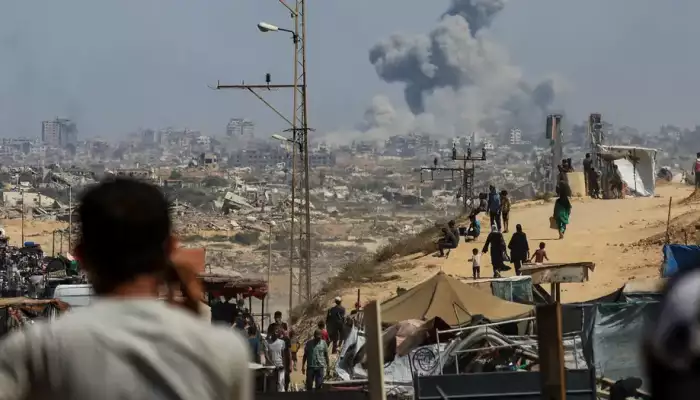
US President Donald Trump said a deal to end the war in Gaza and to release the remaining hostages being held by Hamas could soon be agreed.
Speaking to reporters at the White House before leaving to attend the Ryder Cup golf tournament, Trump said, "it's looking like we have a deal on Gaza."
"I think it's a deal that gets the hostages back, it's going to be a deal that ends the war," the US president added.
He provided no timeline or any details about how the deal would be reached.
Trump is due to meet with Israeli Prime Minister Benjamin Netanyahu at the White House on Monday.
This week, White House Special Envoy Steve Witkoff said the US had circulated a peace proposal for the Middle East to officials from Saudi Arabia, Qatar, the United Arab Emirates, Egypt, Turkey, Jordan, Indonesia and Pakistan, who were gathered in New York for the United Nations General Assembly.
The US proposal to end the war in Gaza calls for all hostages still being held to be returned, no further Israeli strikes on Qatar and a renewed dialogue between Israel and the Palestinians to agree on "peaceful coexistence."
Whether Netanyahu would agree to that last point is doubtful. At the UNGA earlier on Friday, the Israeli leader roundly rejected any notion that Israel would tolerate a Palestinian state from being established, calling the suggestion "sheer madness" that would mean "suicide" for Israel.
The conflict in Gaza began after Hamas carried out a terror attack on October 7, 2023 on southern Israel, killing 1,200 people and taking 251 hostages. Around 48 hostages, only 20 of whom are still believed to be alive, are still being held captive in the enclave.
Israel's campaign in response has left much of Gaza in ruins and killed more than 65,000 people, according to health officials in the Gaza Strip.
Resolution backed by China and Russia to postpone Iran sanctions fails at UNSC
A resolution backed by China and Russia to avert "snapback" UN sanctions on Iran failed after the proposal did not garner enough support from the UN Security Council. The resolution would have delayed the sanctions on Iran for half a year until April 2026 to allow for further negotiations.
The draft was tabled after it only received four votes from the 15-member UNSC. It would have needed nine votes for the sanctions to be postponed.
China and Russia are key allies of Iran who sit on the UNSC. Pakistan and Algeria also supported the proposal.
"We had hoped that European colleagues and the US would think twice, and they would opt for the path of diplomacy and dialogue instead of their clumsy blackmail, which merely results in escalation of the situation in the region," Russian Deputy Ambassador to the UN Dmitry Polyanskiy said ahead of the vote.
'Snapback' sanctions on Iran slated for early Sunday
UK Ambassador to the UN Barbara Woodward said the sanctions will be imposed this weekend.
"We stand ready to continue discussions with Iran on a diplomatic solution to address international concerns about its nuclear program. In turn, this could allow for the lifting of sanctions in the future," Woodward said.
The UK, France and Germany are expected to impose sweeping sanctions on Iran early on Sunday.
The three Western countries, known as the E3, decided to go ahead with the sanctions due to concerns that Iran was not complying with the terms laid out in the 2015 nuclear deal, formally known as the Joint Comprehensive Plan of Action. The UK, France and Germany are particularly concerned that Iran is enriching its uranium stockpile for purposes other than civilian use.
Iranian Foreign Minister Abbas Araghchi claimed that European countries "and the US have consistently misrepresented Iran's peaceful nuclear program." Iranian President Masoud Pezeshkian has characterized the decision to impose snapback sanctions as "unfair, unjust and illegal."
Study finds Gaza injuries among worst seen in modern conflicts
International doctors and nurses who treated Palestinians in Gaza report wounds more severe than those in other recent wars, according to a peer-reviewed study published in the British Medical Journal.
The UK-led survey of 78 humanitarian health workers — most from Europe and North America — cataloged more than 23,700 trauma injuries and nearly 7,000 weapon-related wounds during deployments between August 2024 and February 2025. Two-thirds of respondents had worked in other conflict zones, yet most called the injuries in Gaza "the worst they’ve ever seen," said lead author and British surgeon Omar El-Taji.
Over two-thirds of weapons-related injuries were from explosions — more than double the civilian rate in other modern conflicts and comparable to that of US soldiers in Iraq and Afghanistan. The study also noted an unusually high share of third- and fourth-degree burns, often in children.
"The volume, distribution, and military grade severity of injuries, indicate patterns of harm that exceed those reported in previous modern-day conflicts," the study said.
El-Taji described patients arriving with burns so deep that "you could literally see their muscle and bone." The survey also found malnutrition and dehydration remained widespread amid UN-declared famine conditions.
Participants recounted dire scenes: Mothers pleading to save already-dead children, children voicing suicidal thoughts and medical teams forced to ration care with scant supplies. Researchers stressed the patient data covers only those who survived long enough to reach medical staff.